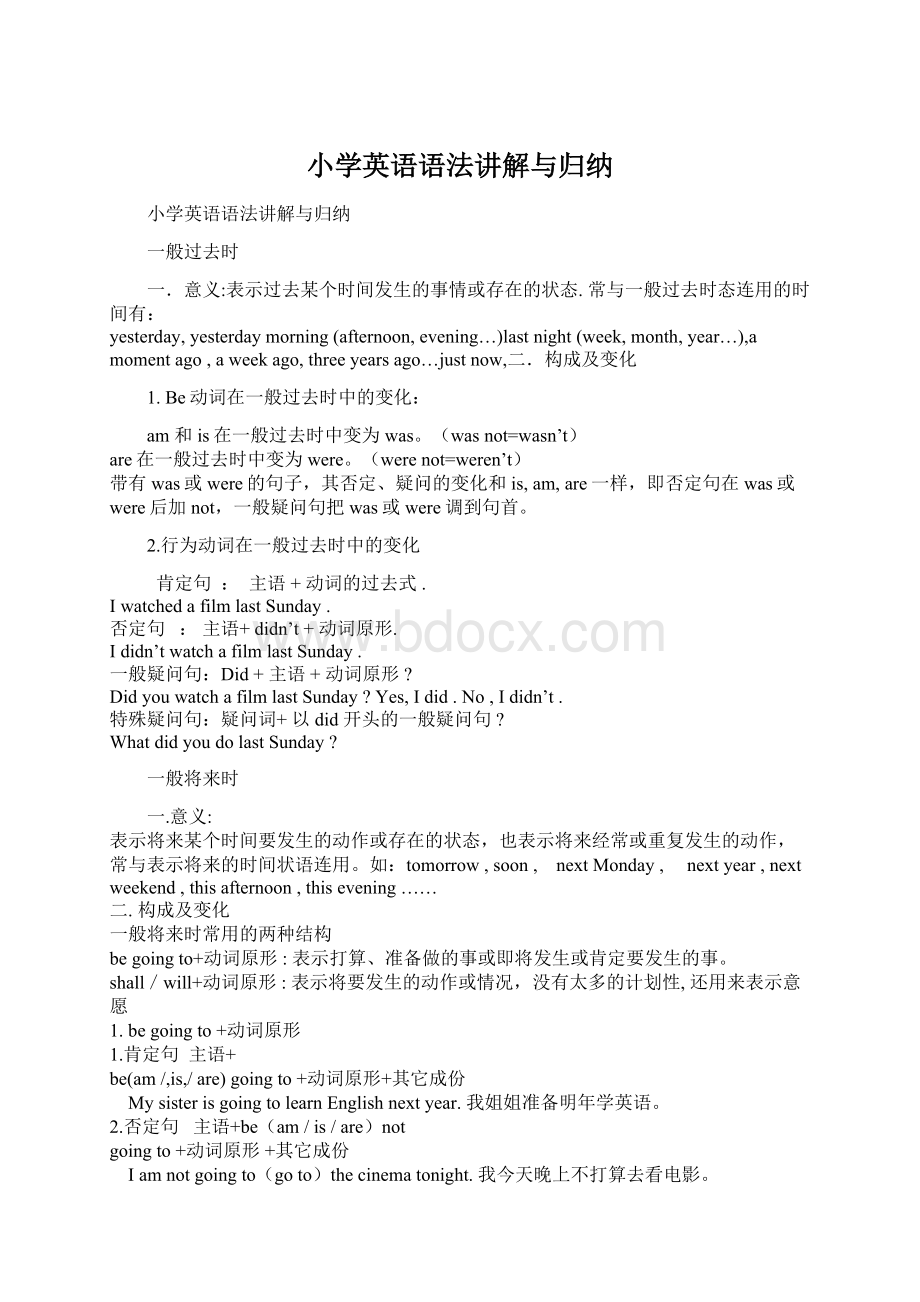小学英语语法讲解与归纳.docx
《小学英语语法讲解与归纳.docx》由会员分享,可在线阅读,更多相关《小学英语语法讲解与归纳.docx(112页珍藏版)》请在冰豆网上搜索。

小学英语语法讲解与归纳
小学英语语法讲解与归纳
一般过去时
一.意义:
表示过去某个时间发生的事情或存在的状态.常与一般过去时态连用的时间有:
yesterday,yesterdaymorning(afternoon,evening…)lastnight(week,month,year…),amomentago,aweekago,threeyearsago…justnow,二.构成及变化
1.Be动词在一般过去时中的变化:
am和is在一般过去时中变为was。
(wasnot=wasn’t)
are在一般过去时中变为were。
(werenot=weren’t)
带有was或were的句子,其否定、疑问的变化和is,am,are一样,即否定句在was或were后加not,一般疑问句把was或were调到句首。
2.行为动词在一般过去时中的变化
肯定句 :
主语+动词的过去式.
IwatchedafilmlastSunday.
否定句 :
主语+didn’t+动词原形.
Ididn’twatchafilmlastSunday.
一般疑问句:
Did+主语+动词原形?
DidyouwatchafilmlastSunday?
Yes,Idid.No,Ididn’t.
特殊疑问句:
疑问词+以did开头的一般疑问句?
WhatdidyoudolastSunday?
一般将来时
一.意义:
表示将来某个时间要发生的动作或存在的状态,也表示将来经常或重复发生的动作,常与表示将来的时间状语连用。
如:
tomorrow,soon, nextMonday, nextyear,nextweekend,thisafternoon,thisevening……
二.构成及变化
一般将来时常用的两种结构
begoingto+动词原形:
表示打算、准备做的事或即将发生或肯定要发生的事。
shall/will+动词原形:
表示将要发生的动作或情况,没有太多的计划性,还用来表示意愿
1.begoingto+动词原形
1.肯定句 主语+
be(am/,is,/are)goingto+动词原形+其它成份
MysisterisgoingtolearnEnglishnextyear.我姐姐准备明年学英语。
2.否定句 主语+be(am/is/are)not
goingto+动词原形+其它成份
Iamnotgoingto(goto)thecinematonight.我今天晚上不打算去看电影。
3.一般疑问句 Be(am/is/are)+主语+goingto+动词原型+其它成份…?
Isyourfathergoingtoplaybasketballwithyou?
No,heisn’t.你父亲打算和你去打篮球吗?
不。
4.特殊疑问句 特殊疑问词(Wh-)+一般疑问句?
WhereareyougoingtospendSpringFesital.?
春节你打算在哪过?
5.注意:
begoingto结构后面习惯上不跟go,come等表位移的动词,一般用该动词的进行时形式表示。
如:
He’sgoingtoNewYorknextweek.下周他要去纽约.
2.will/shall+动词原形
(在书面语中,主语是第一人称时,常用shall,在口语中,所有人称都可以用will)
1.肯定句 主语+will/shall+动词原形+其它成份
I(shall)writetohimnextweek.下周我将给他写信。
2.否定句 主语+will/shall+not+动词原形+其它成份
Theywon’twatchTVthisevening.今天晚上他们不看电视。
3.一般疑问句 will/shall+主语+动词原形+其它成份
Willyoustayathomewithustomorrow?
明天你和我们呆在家里好吗?
4.特殊疑问句
特殊疑问词(Wh-)+一般疑问句
Whenwillyourfatherbeback?
你爸爸什么时侯回来?
附:
ShallI/we…常用来征求对方意见,而问对方是否愿意,或者表示客气的邀请,常用Willyou…?
他们的回答比较灵活。
1.Shallwegotothepark?
肯定Sure,let’sgo.
否定No,let’sgotothecinema.
2.Willyoupleasecometomybirthdaypartynextweek?
肯定Yes,Iwill./Sure.
否定I’msorry.I’mafraidIcan’t.
现在进行时
一.意义——当表示现在正在进行的动作或正在发生的事。
二.构成:
be(am,is,are)+动词现在分词-ing形式
肯定句:
主语+ be+现在分词V-ing(+其他)
I’mdoingmyhomeworknow.
否定句:
主语+be+not+动词-ing+其他.
I’mnotdoingmyhomeworknow.
一般疑问句:
Be+主语+动词-ing+其他?
Areyoudoingyourhomeworknow?
Yes,Iam.No,I’mnot.
特殊疑问句:
特殊疑问词+be+主语+动词-ing+其他?
Whatareyoudoingnow?
三.现在分词的构成:
(1)一般在动词末尾直接加ing,
(2)以不发音字母e结尾的动词,先去掉e,再加ing,
如skate→skatingmake→making dance→dancing write→writing have→having ride→riding come→coming
(3)以重读闭音节结尾的动词,中间只有一个元音字母,词尾只有一个辅音字母,应双写末尾的辅音字母,再加ing,如:
putting running
beginningstoppingswimming shoppingjogging sitting gettingforgettingletting
四.时间标志——now,句前的look,listen
牛津小学英语教材中的特殊动词过去式全归纳
am,is-was,are-were,do-did,go-went,see-saw,say-said,give-gave,
swim-swam,sit-satget-got,come-came,have-had,eat-ate,take-took,
run-ran,sing-sang,put-put,read-read,make-made,write-wrote,draw-drew,
drink-drank,ride-rode,speak-spoke,sweep-swept,find-foundtell-told
stand-stoodthink-thoughtbuy-boughtteach-taught
一、名词复数规则
1.一般情况下,直接加-s,如:
book-books,bag-bags,cat-cats,bed-beds
2.以s.x.sh.ch结尾,加-es,如:
bus-buses,box-boxes,brush-brushes,watch-watches
3.以“辅音字母+y”结尾,变y为i,再加-es,如:
family-families,strawberry-strawberries
4.以“f或fe”结尾,变f或fe为v,再加-es,如:
knife-knives
5.不规则名词复数:
man-men,woman-women,policeman-policemen,policewoman-policewomen,mouse-mice
child-children
foot-feet,.tooth-teeth
fish-fish,people-people,Chinese-Chinese,Japanese-Japanese
写出下列各词的复数
I_________him_________this___________her______
watch_______child_______photo________diary______
day________foot________book_______dress________
tooth_______sheep______box_______strawberry_____
thief_______yo-yo______peach______sandwich______
man______woman_______paper_______juice___________
water________milk________rice__________tea__________
一般现在时
一般现在时基本用法介绍
【No.1】一般现在时的功能
1.表示事物或人物的特征、状态。
如:
Theskyisblue.天空是蓝色的。
2.表示经常性或习惯性的动作。
如:
Igetupatsixeveryday.我每天六点起床。
3.表示客观现实。
如:
Theearthgoesaroundthesun.地球绕着太阳转。
一般现在时的构成
1.be动词:
主语+be(am,is,are)+其它。
如:
Iamaboy.我是一个男孩。
2.行为动词:
主语+行为动词(+其它)。
如:
WestudyEnglish.我们学习英语。
当主语为第三人称单数(he,she,it)时,要在动词后加"-s"或"-es"。
如:
MarylikesChinese.玛丽喜欢汉语。
一般现在时的变化
1.be动词的变化。
否定句:
主语+be+not+其它。
如:
Heisnotaworker.他不是工人。
一般疑问句:
Be+主语+其它。
如:
-Areyouastudent?
-Yes.Iam./No,I'mnot.
特殊疑问句:
疑问词+一般疑问句。
如:
Whereismybike?
2.行为动词的变化。
否定句:
主语+don't(doesn't)+动词原形(+其它)。
如:
Idon'tlikebread.
当主语为第三人称单数时,要用doesn't构成否定句。
如:
Hedoesn'toftenplay.
一般疑问句:
Do(Does)+主语+动词原形+其它。
如:
-Doyouoftenplayfootball?
-Yes,Ido./No,Idon't.
当主语为第三人称单数时,要用does构成一般疑问句。
如:
-Doesshegotoworkbybike?
-Yes,shedoes./No,shedoesn't.
特殊疑问句:
疑问词+一般疑问句。
如:
Howdoesyourfathergotowork?
动词+s的变化规则
1.一般情况下,直接加-s,如:
cook-cooks,milk-milks
2.以s.x.sh.ch.o结尾,加-es,如:
guess-guesses,wash-washes,watch-watches,go-goes
3.以“辅音字母+y”结尾,变y为i,再加-es,如:
study-studies
一般现在时用法专练:
一、写出下列动词的第三人称单数
drink________go_______stay________make________
look_________have_______pass_______carry____
come________watch______plant_______fly________
study_______brush________do_________teach_______
二、用括号内动词的适当形式填空。
1.Heoften________(have)dinnerathome.
2.DanielandTommy_______(be)inClassOne.
3.We_______(notwatch)TVonMonday.
4.Nick_______(notgo)tothezooonSunday.
5.______they________(like)theWorldCup?
6.What_______theyoften_______(do)onSaturdays?
7._______yourparents_______(read)newspaperseveryday?
8.Thegirl_______(teach)usEnglishonSundays.
9.SheandI________(take)awalktogethereveryevening.
10.There________(be)somewaterinthebottle.
11.Mike_______(like)cooking.
12.They_______(have)thesamehobby.
13.Myaunt_______(look)afterherbabycarefully.
14.Youalways_______(do)yourhomeworkwell.
15.I_______(be)ill.I’mstayinginbed.
16.She_______(go)toschoolfromMondaytoFriday.
17.LiuTao_______(do)notlikePE.
18.Thechildoften_______(watch)TVintheevening.
19.SuHaiandSuYang_______(have)eightlessonsthisterm.
20.-Whatday_______(be)ittoday?
-It’sSaturday.三、按照要求改写句子
1.DanielwatchesTVeveryevening.(改为否定句)
___________________________________________________
2.Idomyhomeworkeveryday.(改为一般疑问句,作否定回答)
________________________________________________________
3.Shelikesmilk.(改为一般疑问句,作肯定回答)
___________________________
4.Amylikesplayingcomputergames.(改为一般疑问句,作否定回答)
___________________________________________________
5.Wegotoschooleverymorning.(改为否定句)
_______________________________________________________
6.HespeaksEnglishverywell.(改为否定句)
___________________________________________________
7.Iliketakingphotosinthepark.(对划线部分提问)
________________________________________________________
8.JohncomesfromCanada.(对划线部分提问)
___________________________________________________
9.Sheisalwaysagoodstudent.(改为一般疑问句,作否定回答)
________________________________________________________
10.SimonandDaniellikegoingskating.(改为否定句)
___________________________________________________
五、改错(划出错误的地方,将正确的写在横线上)
1.IsyourbrotherspeakEnglish?
__________________
2.Doeshelikesgoingfishing?
__________________
3.Helikesplaygamesafterclass.__________________
4.Mr.WuteachsusEnglish.__________________
5.Shedon’tdoherhomeworkonSundays._________________
回复人:
都市猎人回复时间:
2007-01-1008:
52
三、现在进行时
1.现在进行时表示现在正在进行或发生的动作,也可表示当前一段时间内的活动或现阶段正在进行的动作。
2.现在进行时的肯定句基本结构为be+动词ing.
3.现在进行时的否定句在be后加not。
4.现在进行时的一般疑问句把be动词调到句首。
5.现在进行时的特殊疑问的基本结构为:
疑问词不达意+be+主语+动词ing?
但疑问词当主语时其结构为:
疑问词不达意+be+动词ing?
动词加ing的变化规则
1.一般情况下,直接加ing,如:
cook-cooking
2.以不发音的e结尾,去e加ing,如:
make-making,taste-tasting
3.如果末尾是一个元音字母和一个辅音字母,双写末尾的辅音字母,再加ing,如:
run-running,stop-stopping
现在进行时专项练习:
一、写出下列动词的现在分词:
play________run__________swim_________make__________
go_________like________write_________ski___________
read________have_________sing________dance_________
put_________see________buy_________love____________
live_______take_________come________get_________
stop_________sit________begin________shop___________
二、用所给的动词的正确形式填空:
1.Theboy__________________(draw)apicturenow.
2.Listen.Somegirls_______________(sing)intheclassroom.
3.Mymother_________________(cook)somenicefoodnow.
4.What_____you______(do)now?
5.Look.They_______________(have)anEnglishlesson.
6.They____________(not,water)theflowersnow.
7.Look!
thegirls________________(dance)intheclassroom.
8.Whatisourgranddaughterdoing?
She_________(listen)tomusic.
9.It’s5o’clocknow.We_____________(have)suppernow
10.______Helen____________(wash)clothes?
Yes,sheis.
三、句型转换:
1.Theyaredoinghousework.(分别改成一般疑问句和否定句)
_____________________________________________________________
_____________________________________________________________
2.Thestudentsarecleaningtheclassroom.(改一般疑问句并作肯定和否定回答)
_________________________________________________________________
_________________________________________________________________
3.I’mplayingthefootballintheplayground.(对划线部分进行提问)
_________________________________________________________________
4.Tomisreadingbooksinhisstudy.(对划线部分进行提问)
_________________________________________________________________
四、将来时理论及练习
一、概念:
表示将要发生的动作或存在的状态及打算、计划或准备做某事。
句中一般有以下